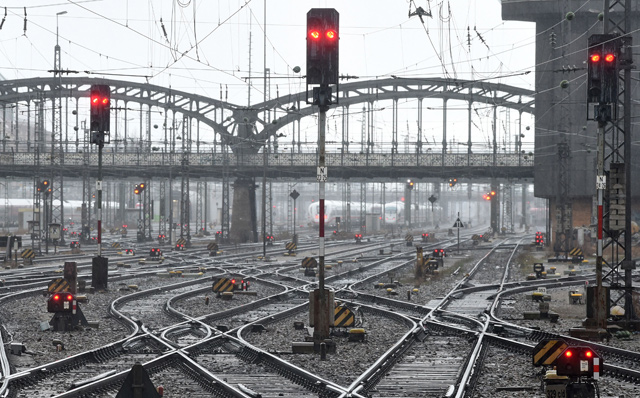BERLIN — German train drivers voted to go on strike from Tuesday over a wage dispute, their union said, in a blow for summer vacationers and adding to logistics and supply woes already plaguing the industry.
The walkout will affect cargo trains from 7pm (17:00 GMT) on Tuesday, before extending to passenger traffic at 2 am on Wednesday, said the leader of the train drivers' GDL union, Claus Weselsky.
Some 95 per cent of union members had voted for the first round of industrial action, which is due to end on Friday.
Train operator Deutsche Bahn slammed the decision as an "unnecessary escalation on the back of rail customers".
"Just as people are travelling more again and using trains, GDL leaders are destroying the upswing that we urgently need given the huge damage from the coronavirus pandemic," said Martin Seiler, DB board member for human resources and legal affairs.
But Weselsky argued that the GDL "intentionally chose this timeframe in the week to limit the impact on weekend and holiday traffic" and that it was "never the best time" for a strike.
He in turn accused DB managers of "lining their pockets while the little guys are getting their pockets picked".
The strike would be the first hitting rail traffic since December 2018, when a stoppage was called for four hours.
It marked a new setback at the height of the key summer vacation season for the travel industry which was only starting to recover after months of shutdown over coronavirus infection risks.
With the walkout also due to affect rail cargo, Germany's industrial groups already hit by supply chain issues risk seeing further delivery delays for raw materials or components from timber to steel to computer chips.
Struggle for influence?
The last major conflict between unions and DB took place between 2014 and 2015, when over nine months, GDL organised nine rounds of strikes to demand regulatory reforms.
The stoppage in May 2015 of six consecutive days has held the record as the longest in the company's history.
This time, GDL argues that it was fighting for a better remuneration deal for train drivers. Among its demands are 1.4 per cent pay hike and a bonus of 600 euros ($704) for 2021, and a further wage rise of 1.8 per cent in 2022.
Deutsche Bahn had offered to phase in a 3.2 per cent wage increase in two steps but the two parties were unable to agree on when the hikes would apply.
Critics have accused GDL of using the strike to gain greater influence and attract members from larger union EVG — which covers railway workers and public transport employees.
The fight for influence was all the more critical due to a rule coming in force this year stipulating that the collective deal negotiated by the biggest union applies across the sector.
Deutsche Bahn was already contending with huge losses as demand for travel drastically shrank over the pandemic which erupted in March 2020.
It was also struggling to rebuild kilometres of tracks destroyed by deadly floods that struck western Germany in mid-July.
